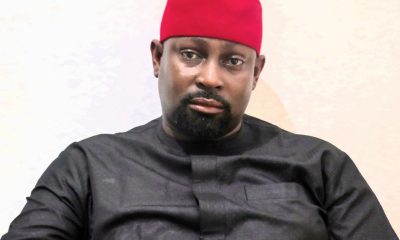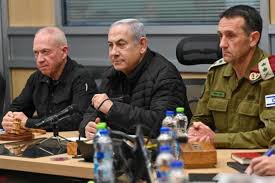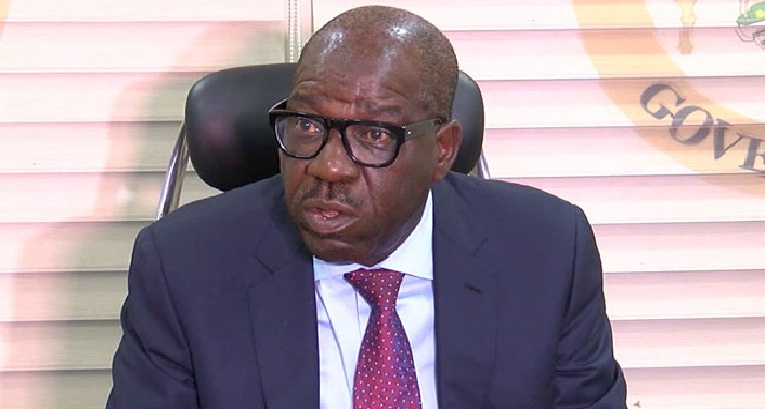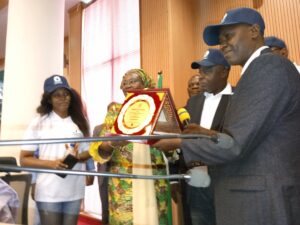OPINION
Is Buhari a Failure?

By Niran Adedokun
I find it interesting that the President, Major-General Muhammadu Buhari (retd.), says he does not want to leave office as a failure. Two weeks ago, this column raised the question about what legacy the president hopes to leave behind in 2023. That question arose because, contrary to what many people think, big infrastructural projects would not count whenever Nigerians remember the president’s stewardship.
So, with the recent manner of speaking, he seemed now conscious of what history would say about him, as should any man of his age and status.One is, of course, not unmindful that Buhari did not utter these words with his mouth. The sound bite came from the National Security Adviser, Major General Babagana Monguno (retd.
), after he emerged from a five-hour security meeting with the honcho, service chiefs and other members of the country’s security team. Monguno told journalists that Buhari “… also made it very, very clear that he’s not ready to exit government as a failure. He is not going to tolerate that; he’s made changes and is ready to make further changes if he is not satisfied. He is completely determined to ensure that there’s a turnaround in the fortunes in the theatre of operations.”The Yoruba say that words from the mouth of a masquerader can only be the contemplation of the gods. It is, therefore, safe to assume that Monguno conveyed the president’s true sentiment. It could also suggest that the man is honest with himself. The security of lives and property in Nigeria has become such a cofounding embarrassment that any must be thoroughly worried.
Some Nigerians, however, hold the opinion that the horse has already bolted from the stable. They reckon that having not achieved significant milestones in 75 months, the remaining 21 months of the regime would be too few for any meaningful reversal of what many consider to be the floundering of the Buhari tenure.
I find that position preemptively pessimistic. The president’s recent assent of the Petroleum Industry Act (warts and all), the prompt appointment of an implementation committee and the positive signals it sent to industry players are tell-tale signs that buying people’s trust isn’t necessarily rocket science.
A lot of time, seemingly simple but honest steps taken by leaders are all the people need to restore trust and support for the government of the day. So, when a government expresses its commitment to positive change and leaving the country better than it currently is, I would instead query its understanding of that promise and what it must do to achieve it, rather than how much time it has left. In managing people, little actions or words that cost leaders next to nothing can foster peace or war.
For example, President Buhari reportedly made this remark about the security situation in the country. He received briefings on troops’ exploits in the war against insurgency, which has led to the repentance of hundreds of terrorists. But Tuesday’s unprecedented event where the country’s apex military training institution, Nigerian Defence Academy, Kaduna, suffered a terrorist attack (even though the media still referred to the perpetrators as bandits) raises questions about the president’s grasp of the country’s troubles.
Governor Aminu Masari of Katsina State had days earlier asked his people to defend themselves against bandits! Between Friday when he vowed not to leave office a failure and Tuesday, “bandits” killed eight and abducted 25 people in Zamfara state; they killed 10 people in Kaduna State; and 14 in Buhari’s native Katsina state. The terrorists shot two officers dead and kidnapped a Major in operation, which sent shock waves down the polity. The city of Jos in Plateau state has also been on fire lately.
It has been two whole months now that the president promised to speak to separatist agitators and those who incite trouble in Nigeria in the “language they understand”. Yet, there has been no remarkable improvement in the situation.
At such junctures, one would imagine a reconsideration of strategy! If you can’t move forward in a journey, it makes sense to consider a retreat, so you can live to fight another day. The Jewish scientist, Albert Einstein, once pointed out the awkwardness of doing the same thing repeatedly and expecting a different result. And a president who wants to succeed in his remaining few days in office must take advice from this and become more hands-on.
As well-trained and effective as the Nigerian security agencies might be, it is evident that the level of conflict in the country is becoming overwhelming. Can we even tell that there are no elements in these agencies sympathetic to the cause of insurgents, terrorists, bandits, and others taking arms against the country? Therefore, it is unlikely that the military and other security agencies will ever comprehensively contain the security challenges that the country currently faces on the battlefield.
This suggests that it is time to employ the brain alongside the brawn in these security matters. Whether they call it carrot and stick or kinetic and non-kinetic, this regime needs to, at this stage, yank off its messianic mentality, bury its pride, seek help, and try all possible peaceful means of de-escalating tensions in Nigeria. The security of lives and property is the primary responsibility of the government, and citizens do not need to know how the government achieves this. People just want to sleep with their two eyes closed, and it is the least a government can do for its people. There are conflicts in this country that do not need the deployment of troops, a situation that honest conversations would put to final rest. These are the kind of opportunities that President Buhari should begin to pursue in this twilight personally.
Take the president’s grazing routes pet project as an instance. He recently set up a committee to review “with dispatch” 368 grazing sites that a previous committee identified. This action is despite the apparent stand of many state governors against grazing sites and the clear anachronism of the idea. Even if this concept is the only thing that can save Nigeria from the frequent clashes between farmers and herders, it would be more effective to call a meeting of all governors. At this meeting, Buhari must restrain himself from playing a know-it-all emperor but rub minds with them on dealing with the nagging challenge.
The realization of the import of collegial processes in tackling knotty national issues would determine whether Buhari’s wish to leave a legacy of success is a mere dream or vision, which he is determined to see through. It is unlikely that you would ever find anyone who does not wish to leave their world better than they met it; however, achieving the same requires willpower and the competence for execution. Otherwise, wishes would be like the proverbial horses, which beggars ride with abandon.
It is curious, for example, that President Buhari is comfortable with the ongoing industrial action by members of the National Association of Resident Doctors, which his ministers of health and employment are unable to resolve. That is when Nigeria is under the threat of the third wave of the COVID-19 pandemic alongside disgraceful afflictions like cholera, malaria and what have you.
According to a report in the media earlier this week, hospitals in Saudi Arabia recently had a recruitment exercise for specialist doctors in Nigeria. That exercise indicates that the reported 1:5,000 doctor to patient ratio in Nigeria is about to worsen. Yet, the president has not seen the need to galvanize action towards retaining doctors who are leaving the country in droves. He has not led any national initiative, which encourages governors to improve primary health care delivery standards and facilitate more accessible health care delivery through community health insurance.
The president wants to succeed, yet, he has not done much for education. Despite the increase in the numbers of higher institutions, more than one and a half million qualified candidates do not get admitted annually. Yet, there are no plans for that gap year, no vocational training to get their hands busy or empower them with sustainable skills.
Out-of-school children figure increases by the day. Those who go to school are abducted daily and left in the hands of bandits for months on end. Yet, these are the ones who should hold the future of the country. Nigeria just seems to have lost her soul as far as the welfare of its children is concerned.
The main gist here is that President Buhari can still do a few things to make Nigeria better and fulfill his dream for success. If he gets it right on the security front, but most of Nigeria’s children and youths are ill-equipped to face the future, and a significant number of Nigerians continue to grapple with a wobbly health system, this regime will still have failed Nigerians, who reposed so much confidence in it. There is still ample time to change this narrative if the will and knowledge are available.
OPINION
Mohammed: A Visionary Leader Revolutionizing The Paradigm Of JEDC

By Friday Adakole Elijah
On October 18, 2022, Engr. Abdu Bello Mohammed assumed the mantle of leadership as the Managing Director/Chief Executive Officer of Jos Electricity Distribution Plc thereby inheriting a plethora of formidable challenges that threatened to stifle the organization’s growth.
Undeterred by the complexities of the task, Mohammed embarked on a transformative odyssey, driven by an unwavering determination to catapult the organization to unprecedented heights of success. As he navigated the labyrinthine landscape of obstacles, including antiquated equipment, inadequate network systems, energy theft, vandalism, and a dearth of skilled manpower, Mohammed’s leadership acumen and strategic prowess proved instrumental in surmounting these challenges. The introduction of innovative solutions, such as the load-sharing program, ensured that customers received a minimum of 16 hours of daily energy distribution, despite the company receiving only a paltry of the total energy generated to the national grid. Mohammed’s visionary leadership has yielded tangible results, as evidenced by the procurement and installation of cutting-edge equipment, including transformers, network improvement gear, and smart prepaid meters. These initiatives have significantly enhanced the organization’s operational efficiency, underscoring Mohammed’s commitment to excellence. The introduction of the “Debt Discount Promo” has incentivized customers to settle their outstanding debts, thereby reducing the company’s receivables and bolstering its financial stability. Mohammed’s diplomatic finesse has also been on full display, as he has fostered a spirit of cooperation and collaboration through courtesy visits to esteemed stakeholders, including the Governors of Benue, Bauchi, Plateau, and Gombe states, traditional rulers, and security chiefs. His business visit to NASCO Group of Companies, Ashaka Cement and Dangote Cement has underscored the company’s commitment to providing qualitative energy solutions to its esteemed clients, while his confirmation of the appointment of 121 staff and promotion of over 1,600 employees has boosted morale and motivation within the organization. The institution of monthly awards for the best-performing region has injected a healthy dose of competition, driving staff to strive for excellence and embodying Mohammed’s leadership philosophy, which emphasizes empathy, firmness, and a relentless pursuit of excellence. In conclusion, Engr. Abdu Bello Mohammed’s transformative leadership has reinvigorated Jos Electricity Distribution PLC, propelling it toward unprecedented heights of success. His vision, strategic acumen, and diplomatic flair have created a new paradigm for the organization, one that prioritizes efficiency, customer satisfaction, and employee welfare. As the organization continues to soar under his guidance, one thing is clear: Jos Electricity Distribution PLC is working, and Engr. Abdu Bello Mohammed is the mastermind behind its resurgence. Elijah is the Head, Corporate Communications, Jos Electricity Distribution PLC.OPINION
Looking beyond CBN’s Cocktail of Policies to 2025

By Toni Kan
Six months ago a friend I go on daily runs with took ill on a Monday evening. It was sudden and by the time I saw him hours later at the hospital, he was lying there very sick, very frail and hooked up to machines.
The diagnosis was sepsis and we were all surprised.
The morning before he took ill, we had gone on a 6km run. That was 2km more than our usual but there was a reason. We had gone to a party on Saturday and some “damage” had been done. So that Monday morning we had agreed to run the “foolishness” out of our system.Sepsis is a major killer in the UK and is described as “a life-threatening condition by The UK Sepsis Trust which says it “can lead to shock, multiple organ failure and even death if not recognised and treated promptly.
”Statistics from the NHS are more sobering. Sepsis “kills five people every hour and accounts for about 50,000 deaths per year in the UK alone.”
So, my friend was lucky to have “listened” to his body and gone to the A&E where he was prescribed a cocktail of drugs that included powerful antibiotics as well as hydrocortisone, vitamin C, thiamine and lots of intravenous fluids.
That incident came to mind as I read the Keynote Address delivered by Olayemi Cardoso, Governor of the Central Bank of Nigeria at the 59th Annual Dinner of the Chartered Institute of Bankers of Nigeria (CIBN) on November 29, 2024.
Nineteen pages long, it was expansive, insightful, comprehensive, wide-ranging, bold and visionary in acknowledging the myriad of issues they met on ground, the challenges encountered so far in fixing them and strategy for the future. It was like a Job Description and a set of Key Performance Indicators (KPIs) rolled into one.
Reading through, the image that loomed before me was of my friend on that hospital bed. When we met in the morning, he was bubbly and rearing to go with none of us the wiser about the bacteria ravaging his system. By evening the bacteria had won and it would have been a different story if doctors had not given him that cocktail of medicines.
The financial system Yemi Cardoso and team met on ground was being ravaged by an unseen bacteria and leading to a system collapse. The prognosis was bad – high inflation, multiple exchange rates, unchecked subsidy and rampant arbitrage, lack of access to international capital markets, poor investor confidence, waning foreign portfolio inflows, declining exchange reserves and decreasing diaspora remittances, a huge FX backlog, excessive money supply growth at 13% annually, fiscal crisis from unprecedented Ways and Means advances to the FG of N22.7 trillion and many more.
Yemi Cardoso was like a doctor who came to the quick realization that urgent action was required to stem the tide and steer the financial ship to a safe port.
What he did, he told the CIBN, was attack with a cocktail of “targeted policies, transparent market operations, effective coordination between monetary and fiscal authorities, and a commitment to rebuild trust.”
What did he think success would look like after this cocktail of policies has been implemented? Cardoso told his audience that what the CBN expects in 2025 and beyond is a regime that will see the CBN “stabilize the exchange rate, curb inflation, strengthen banks’ capital buffers, and foster an environment conducive to the success of both businesses and individuals.”
These are already happening and Olayemi Cardoso was not shy in pointing out areas where progress has been made.
External reserves which fell to $33.22bn in December 2023 have grown back to $40bn the highest level in 3 years and “the equivalent of eight months’ import cover.”
That is a reflection of rising investor confidence evident in the 72% growth in foreign portfolio inflows and increase in diaspora remittances from a monthly average of $300m to $600m with a monthly target of $1bn set by the CBN.
This is being buoyed by the integration of the Nigerian diaspora into our financial system by initiatives like the introduction of the non-resident BVN registration. At the time of writingthis piece, news of an oversubscribed Eurobond issue of $2.2bn filtered out from the Debt Management Office (DMO).
The fiscal crisis from excessive Ways and Means which was the equivalent of almost 11% of our GDP in 2023 before Cardoso and team took over at the CBN has been ended with the backlog of over $7 billion in unfulfilled commitments cleared.
The FX market has been stabilized with a tightening contraction in the gap between the official and parallel markets and more sanity is expected with the take-off on December 2, 2024 of the electronic FX matching system. Analysts are already forecasting that the naira will end the year low.
A regime of transparency has led to regular and improved financial stability reports, balance of payments data, and FX market updates, datasharing, the launch of a new website and technology driven innovations intended to “strengthen the CBN’s credibility and public trust in our policies.”
Speaking at that dinner, Cardoso summarized his ultimate destination as “price and exchange rate stability, catalyze sustainable economic growth, and protect the livelihoods of millions of Nigerians.”
While all these are cause for cheer, challenges remain. The naira is still taking a beating something Cardoso has attributed to buyer’s desperation and a distorted view of the value of the naira relative to the greenback. This will hopefully be solved in 2025 and beyond by “the introduction of the electronic matching system” which “will correct these distortions by enhancing the price discovery process.”
Inflation remains a thorny issue at 33.88% despite efforts to “contain inflation and restore stability” by “raising the Monetary Policy Rate by 875 basis points to 27.5%”. The inflation target of 21.4% is yet to be achieved.
But Cardoso is upbeat: “Our tight monetary policy stance has altered the previous dire trajectory, and we expect a downward trend in 2025. Inflation remains unacceptably high, but the signs are encouraging, particularly given that the full effects of monetary policy typically take 6-9 months to impact the consumer sector.”
To conclude one must ask whether Cardoso and his team have factored in the coming of Donald Trump into their plans for 2025. As Cardoso noted in his keynote, the pandemic, global geopolitical tensions and inflation have had a deleterious effect on emerging markets in the form of “withdrawal of capital flows” thus “creating new challenges for economies like ours.”
Speaking further he noted that “Major central banks are gradually easing their monetary conditions and this shift is slowly reopening access to international capital markets for emerging economies.”
But for how long? Recent comments from Donald Trump in reaction to plans for de–dollarisation by the BRICS nations deserve attention from the CBN as the apex bank looks to the future.
This is important because in October this year, Nigeria formalized its romance with the BRICS bloc by becoming a partner as reported by The Punch. “BRICS has officially expanded its alliance, adding 13 new nations as partner countries, though not as full members…The countries are Algeria, Belarus, Bolivia, Cuba, Indonesia, Kazakhstan, Malaysia, Nigeria, Thailand, Turkey, Uganda, Uzbekistan, and Vietnam.”
High on the agenda of the BRICS nations and their partners is to establish “a unified currency or bolster bilateral trade agreements that bypass the dollar. These efforts aim to reduce reliance on the U.S. dollars…” reports Global Financial Digest
Trump has reacted to this by threatening 100% tariffs on imports from the BRICS nations. As President, Donald Trump’s plans to entrench his America First doctrine and the dollar’s hegemony will hobble plans for de-dollarisation of economies in the BRIC bloc as well as the emerging markets of the global south which remain vulnerable to tectonic shifts in the larger global economy.
This is something that could have repercussions for the Nigerian economy described by Cardoso as a “resource-intensive” country.
Kan is a PR/crisis management expert and financial analyst.
OPINION
For the Three Musketeers of Kano
By Lasisi Olagunju
An epic poet describes the Fulani hunter as “shepherd of wild animals.” The hunter is also the one “who knows the calm and wild forest, with its many dangerous paths…..” When a man so described describes you as a target, you had better go sew a dress of steel.
If you are from the South-West and you can read, read this: “Our next target now is this geo-political zone. The south-west geo-political zone. You know we are good at getting the target. We will do all that is possible to bring them into the fold.” That is from Abdullahi Ganduje, immediate past governor of Kano State and incumbent national chairman of the All Progressives Congress (APC). He made the solemn pledge in Akure, the Ondo State capital, after his party’s governorship election victory in that state two weeks ago.Now, which fold was Ganduje talking about? And who are the “we” that are “good at getting the target”? Ganduje is smart. He chose his words deliberately and carefully. The strongman from Kano has significantly stepped back from his earlier obsession with capturing Oyo and Osun states. He now targets the entire zone. For whom? It can’t be for the APC – the party already has two-thirds of the zone. In Adebayo Faleti’s ‘Ogun Awitele’ (Foretold War), a band of thieves sent a handwritten letter to a village head: “We are coming to rob your people in seven days’ time.” The tone of the letter rattled the Baale and his chiefs. If you are sure of the efficacy of your amulets, you swear by them. The leader of the band of thieves signed his name as Ajiboogunsoro (he-who-wakes-up-to-converse-with-charms). A significant takeaway from that moment of fear and anxiety is the village head’s charge to his security chiefs to always know that no matter how powerful the boastful invaders are, “you should always remember that you are hunters, they are thieves (ode ni yín, olè ni wón)”. What Ganduje, the big man, said is evocative of a deja vu. There is something in Nigeria’s political history that suggests today’s mission as an echo of a daring, fateful yesterday.But, whatever the man might be saying, I suggest he and his “we” take time to watch closely the Eyo masquerade of Lagos and listen attentively to their songs. The Eyo seductively mock their challengers with a folk song composed for colonialism on the futility of its land-grabbing propensity. They sing: “The white man took Oluwole; Lagos did not utter a word. With ease, the white man took Marina; again Lagos was silent. Now, they want to take Isale Eko. They think we are dumb.” The Eyo actually use the Hausa word, Kurumo (deaf and dumb). The Kano man, Ganduje, understands perfectly the imagery of the speechless who is at the same time dead in hearing. I am very sure that no one ever takes the South-West as a zone of the invalid, deaf and dumb.Rabiu Musa Kwankwaso is a former governor of Kano State. He has been the boss (and friend) of Ganduje from the beginning of time. In a speech he delivered at the convocation ceremony of Skyline University, Kano, two weeks ago, Kwankwaso claimed that “Lagos” was working hard to enslave the whole North. He said: “Today, we can see very clearly that there is a lot of efforts from the Lagos axis to colonize this part of the country.” Kwankwaso is an old war horse and a rambunctious power-player. You ignore him at your peril, and to your sorrowYou remember a gentleman called Festus Odimegwu, a former Managing Director of the Nigerian Breweries Plc who was made the chairman of the National Population Commission (NPC) by President Goodluck Jonathan? In October, 2013, because Odimegwu said “No census has been credible in Nigeria since 1816″ (1866?), Kwankwaso stormed the Villa and asked President Jonathan to sack the man as NPC chairman. Kwankwaso told State House correspondents after meeting Jonathan: “I also raised the issue of the chairman of the National Population Commission, NPC, headed by one Festus Odimegwu. We are not happy about that appointment, and (we) think that it was a mistake. He (Odimegwu) had only worked in the alcoholic industry all his life. And my guess is that he’s taking a lot of his products and that is why we feel that his appointment is a mistake because he cannot be the chairman of NPC and at the same time attack what his predecessors have done.” With “automatic alacrity”, Jonathan obeyed Kwankwaso and asked Odimegwu to go on October 17, 2013. That is how you feel the power of power.Ganduje was direct in naming his target: the South-West. Kwankwaso went poetic; Lagos was (is) his metaphor for the West. The man who wants to be president of Nigeria also spoke on tax collection. He said: “Today, we are aware that the Lagos young men are working so hard to impose taxes and take away our taxes from Kano and this part of the country to Lagos.” Who are Kwankwaso’s “Lagos young men”? And what VAT is Kwankwaso fighting over? VAT from confiscated products of “the alcoholic industry”? Or from the leveled groundnut pyramids of Kano?Kwankwaso spoke about colonialism; Ganduje spoke about “getting the target.” Those two deserve more than anyone’s passing attention. Between them, Kano has been a captive cripple since 1999. Ibrahim Shekarau who acted during an interlude was Kwankwaso’s permanent secretary. The incumbent governor, Abba Kabir Yusuf, is Kwankwaso’s son-in-law. Check the figures: How many poor people did they meet in Kano in 1999, how many do they have now? In his ‘The Psychology of Science: A Reconnaissance,’ Abraham Maslow wrote in 1966: “If the only tool you have is a hammer, it is tempting to treat everything as if it were a nail.” Some describe what Maslow propounded as the ‘law of the instrument’. Others say it is the ‘law of the hammer’. Yet, some other analysts prefer to christen it ‘Maslow’s hammer’ or ‘the golden hammer.’ For persons whose idea of leadership is all about slave raiding, zone targeting and capturing, their choice of mission will always employ the rhetoric of slavery.While Ganduje and Kwankwaso are doing their own their ways, the third Kano man, Shekarau, has been busy setting up a group he calls League of Northern Democrats (LND). At a meeting with the Arewa Consultative Forum (ACF) in Kaduna some days ago, a more nuanced Shekarau spoke on why he is doing what he is doing: “This marks the beginning of what we hope will be a transformative coalition for Northern Nigeria to confront its challenges…The challenges facing our region – poverty, insecurity, illiteracy, religious intolerance, disunity, and diminishing political influence – are indeed serious. The North is today in an ugly situation…” There is a fitting quote here attributed to Albert Einstein: “We cannot solve our problems with the same thinking we used when we created them.” Those who disfigured the face of beautiful northern Nigeria cannot now beautify it. You know what happened when the monkey insisted she wanted to beautify her child’s ugly face? She pushed the eyeballs deeper into the sockets. Monkey’s fingers are not structured to beautify anything. Take a look at them.So, when I heard Ganduje say that his target was the South-West, I wondered why it is not his “target” that Kano’s groundnut pyramids are restored. And, when Kwankwaso said ‘Lagos’ was determined to colonise his “part of the country”, you should wonder why his rhetoric was all about power and not how to make his part of the country as safe and prosperous as the part where Lagos belongs. And Shekarau spoke about the North’s “diminishing political influence.” If I would counsel him, I would suggest that what the North of 2024 needs to regain its mojo is for its leaders to make the region safe by educating their young, and empowering and feeding their poor without enslaving them.I call Kwankwaso, Ganduje and Shekarau the three musketeers of Kano. A soldier armed with a musket is a musketeer. In French history, we read of the Musketeers of the Guard (Mousquetaires de la garde) or the King’s Musketeers (Mousquetaires du roi). They existed to fight the king’s battles. Their exploits of guile, of swordsmanship and chivalry later spilt over to the plains of popular culture. Because of them, we have books and films with ‘The Three Musketeers’ (Les Trois Mousquetaires) as titles. The story of Kano since 1999 has been an intricate story of war and romance among those three musketeers who shared the years equally among them. They are not done with that city state, and with their North. They are not even done with the whole country. That is what you get when an elite band targets, captures and enslaves an enclave. Get your popcorn. They appear gearing up for war – with “Lagos”. And a good fight is coming.






























